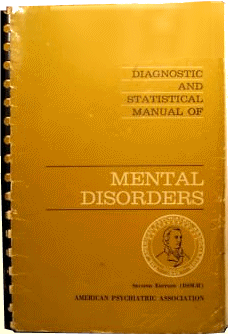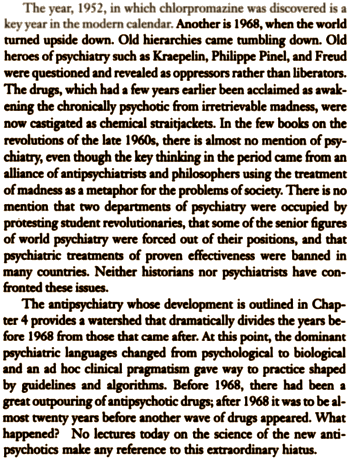 In The Creation of Psychopharmacology, Dr. David Healy describes an interesting historical landmark – 1968. If you were alive in 1968, you remember that year like it was yesterday – the TET Offensive in Viet Nam, the Civil Rights Act, the MLK and RFK assasinations, the riots at the Democratic Convention in Chicago, the tanks rolling into Prague ending the Prague Spring, President Nixon’s election, and then spending your holidays watching the Astronauts orbiting on the far side of the moon. If something could possibly change, it changed in 1968. Psychiatry even got into the game, releasing the DSM-II – the version with the psychodynamic descriptions of the neuroses.
In The Creation of Psychopharmacology, Dr. David Healy describes an interesting historical landmark – 1968. If you were alive in 1968, you remember that year like it was yesterday – the TET Offensive in Viet Nam, the Civil Rights Act, the MLK and RFK assasinations, the riots at the Democratic Convention in Chicago, the tanks rolling into Prague ending the Prague Spring, President Nixon’s election, and then spending your holidays watching the Astronauts orbiting on the far side of the moon. If something could possibly change, it changed in 1968. Psychiatry even got into the game, releasing the DSM-II – the version with the psychodynamic descriptions of the neuroses.

I’m not postulating anything mysterious like synchronicity, maybe something more like the adage, "history repeats itself," but it sure sounds a lot like our ever-so-recent history. We’re about to have us a controversial DSM released. The field is still reeling from the scandals and a year of record setting suits against the pharmaceutical industry. The Sunshine Act and ProPublica are targeting Conflict of Interest. The pharmaceutical industry has abandoned CNS drug development en masses, closing its labs. And the move for reform of the Clinical Trial process is accelerating [the TEST ACT, the BMJ, the Cochrane group, etc]. We are at the beginning of an end, or perhaps the end of a beginning – very like the state of play in 1968. And like that era with Managed Care cutting its teeth, we have ObamaCare tossed into the mix.
Sorry, the comment form is closed at this time.